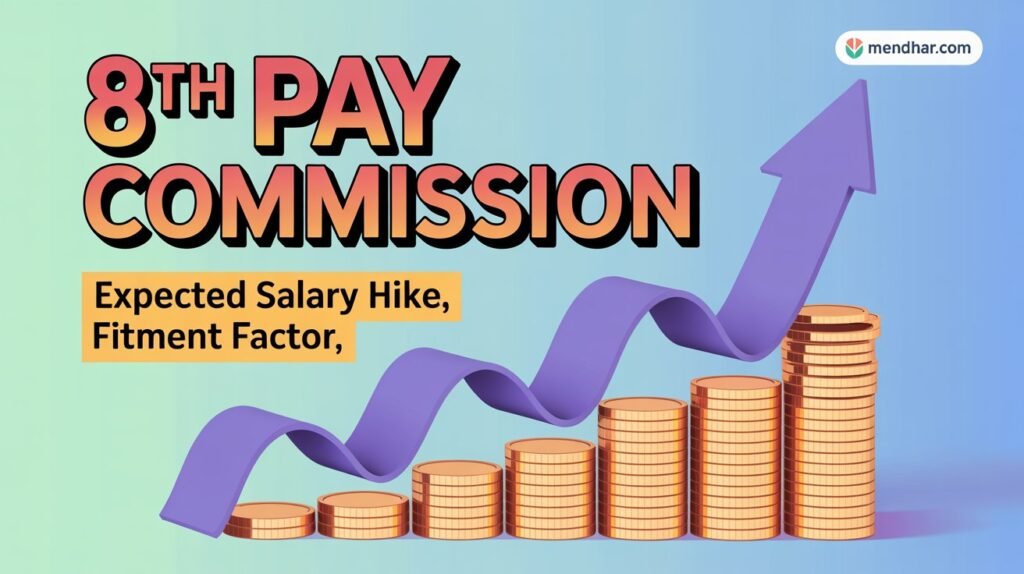Table of Contents
Toggle8th Pay Commission Approved: Massive Salary and Pension Hike Expected for Central Employees
The Indian government has officially approved the 8th Pay Commission, bringing cheers to over 1 crore central government employees and pensioners. This landmark decision is set to bring a massive increase in salary and pension, with implementation expected from January 1, 2026. The 8th Pay Commission recommendations will focus on revising pay scales, allowances, and pensions, ensuring better financial stability for millions.
In this blog, we will explore the key highlights of the 8th Pay Commission, including the expected fitment factor, revised salary structures, pension updates, and the potential impact on government employees.

What is the 8th Pay Commission?
The 8th Pay Commission is a government-appointed body responsible for reviewing and revising the salaries, allowances, and pensions of central government employees and pensioners. The 7th Pay Commission, implemented in 2016, had a significant impact on pay structures, and now, a decade later, the 8th Pay Commission aims to further enhance financial benefits.
The 8th Pay Commission will focus on:
Revising basic pay and allowances
Adjusting the fitment factor for salary calculations
Increasing pension benefits for retirees
Aligning salaries with inflation and current economic conditions
Expected Salary Hike Under the 8th Pay Commission
One of the most talked-about aspects of the 8th Pay Commission is the potential fitment factor revision. The fitment factor is a multiplier used to calculate salaries based on the previous pay structure.
7th Pay Commission
Fitment Factor: 2.57
Expected 8th Pay Commission
Fitment Factor: 2.86
This increase could lead to a substantial rise in salaries:
| Category | Current (7th CPC) | Expected (8th CPC) |
|---|---|---|
| Minimum Basic Pay | Rs. 18,000 | Rs. 51,480 |
| Maximum Basic Pay | Rs. 2,50,000 | Rs. 7,15,000 |
| Minimum Pension | Rs. 9,000 | Rs. 25,740 |
This massive increase in salary and pension will significantly improve the financial condition of government employees and retirees.
Key Focus Areas of the 8th Pay Commission
Key Focus Areas of the 8th Pay Commission
1. Fitment Factor Revision
The fitment factor plays a crucial role in determining salary hikes. If the 8th Pay Commission increases it to 2.86, employees will see a 30-35% rise in their basic pay.
2. Pension Updates
Pensioners will also benefit from the 8th Pay Commission, with pensions expected to increase from Rs. 9,000 to Rs. 25,740 for the lowest bracket. This will help retirees cope with rising inflation.
3. DA (Dearness Allowance) Merger
There are discussions about merging a portion of DA (currently at 50%) into the basic pay, which could further boost salaries.
4. HRA and Other Allowances
House Rent Allowance (HRA), travel allowances, and medical benefits are also expected to see revisions under the 8th Pay Commission.
Impact of the 8th Pay Commission on the Economy
The massive increase in salary and pension will have several economic effects:
✅ Boost in Consumer Spending: Higher salaries mean more disposable income, leading to increased demand for goods and services.
✅ Improved Employee Morale: Government employees will benefit from better financial security.
✅ Higher Savings & Investments: Employees may invest more in real estate, mutual funds, and other financial instruments.
✅ Inflationary Pressure: Increased salaries could lead to slight inflation in the short term.
Challenges Ahead for the 8th Pay Commission
While the 8th Pay Commission brings good news, there are challenges:
❌ Fiscal Burden on Government: A massive increase in salary and pension could strain the central budget.
❌ Delay in Implementation: Past pay commissions have faced delays in finalizing recommendations.
❌ Private Sector Pay Parity: Private employees may demand similar hikes, leading to wage inflation.
Implementation Timeline
The 8th Pay Commission is expected to submit its final report by mid-2025, with implementation likely from January 1, 2026. Here's a tentative timeline:
June 2024
Formation of the 8th Pay Commission committee
December 2024
Draft recommendations submitted
June 2025
Final report submission
January 2026
Expected implementation
Conclusion :
The 8th Pay Commission is set to bring a massive increase in salary and pension, transforming the financial landscape for central government employees and pensioners. With an expected fitment factor of 2.86, salaries could see a 30-35% hike, while pensions may nearly triple for some retirees.
As we await the final recommendations, one thing is clear—the 8th Pay Commission will play a pivotal role in shaping the future of government employment in India. Stay tuned for more updates on this landmark reform!
Welcome to Mendhar.com - Your Gateway to Academic Excellence!
Mendhar.com is your ultimate academic companion for competitive exams and school education. We provide:
Our personalized courses cover:
Why students love Mendhar.com?
Join 5000+ successful students today!
Have questions? Contact us or visit mendhar.com

